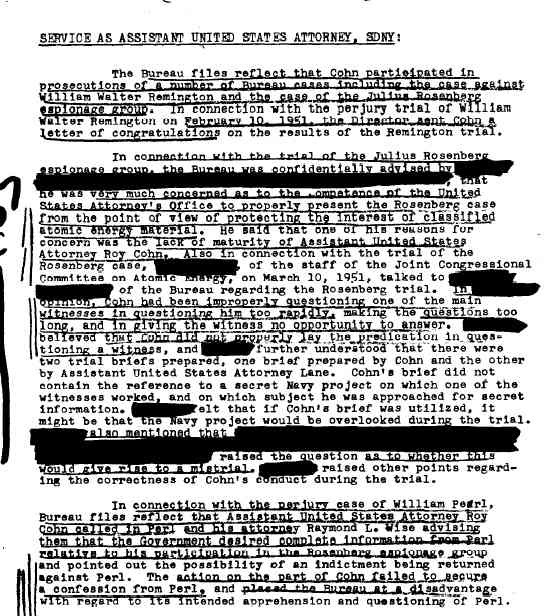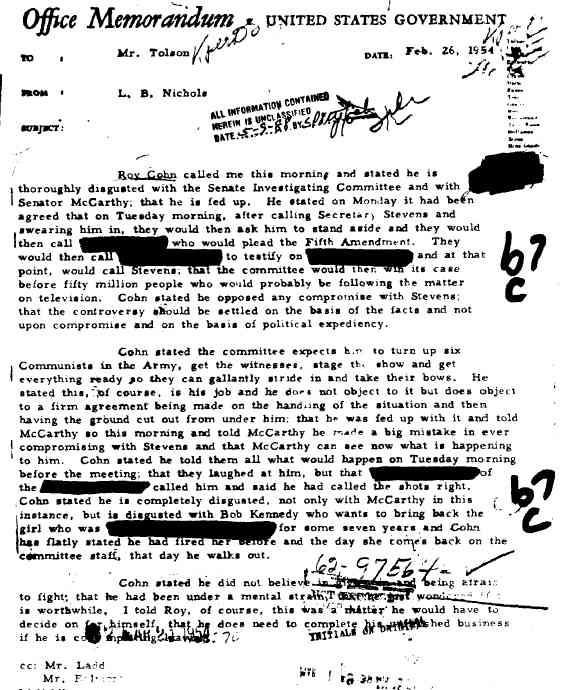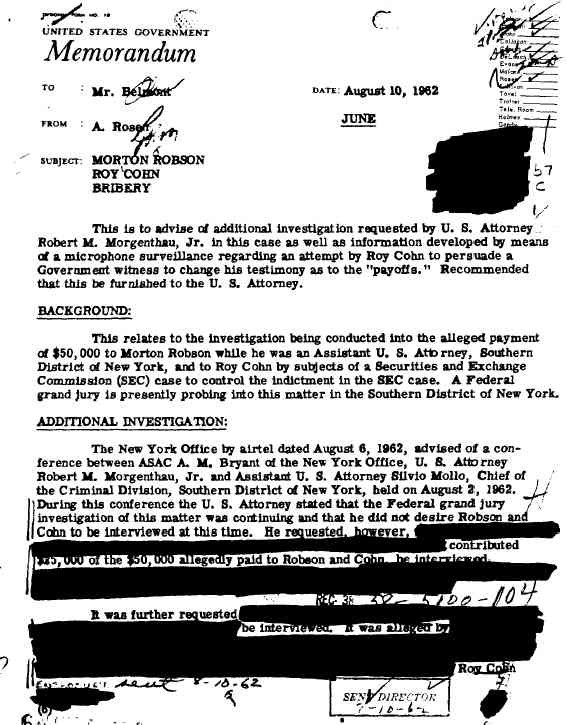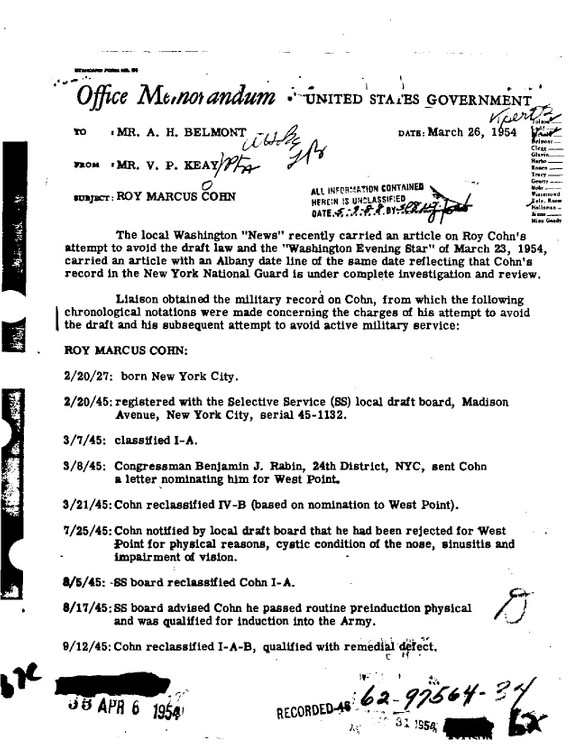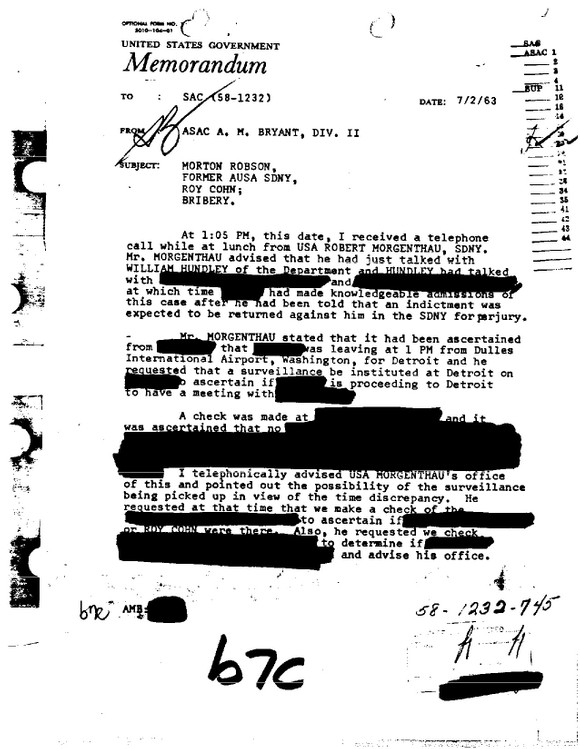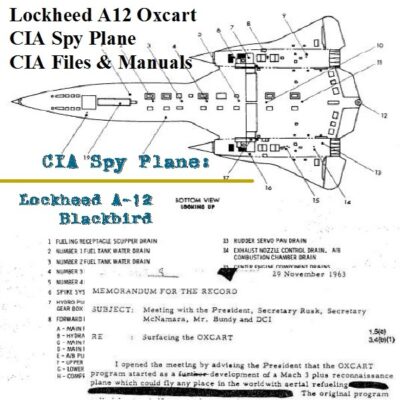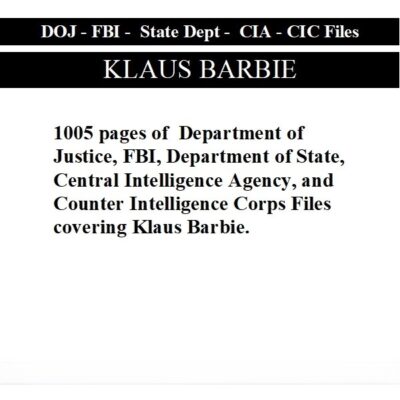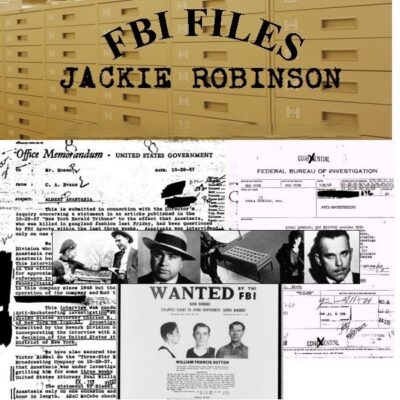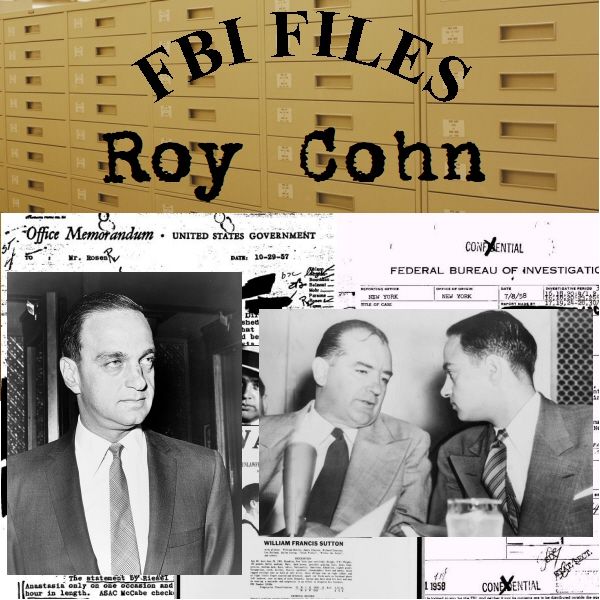
Description
Roy Cohn: A Timeline, Key Figures, and FBI File Insights
Timeline of Main Events
- February 20, 1927: Roy Marcus Cohn is born in New York City.
- Young Adulthood: Cohn attends Columbia Law School.
- Age 21: Roy Cohn passes the New York State Bar exam.
- Early Career: Cohn becomes an Assistant U.S. Attorney for the Southern District of New York.
- 1951: Roy Cohn plays a significant role in the prosecution of Julius and Ethel Rosenberg. His cross-examination of Ethel Rosenberg’s brother is seen as central to their conviction.
- 1952: Senator Joseph McCarthy appoints Roy Cohn as the chief counsel to the Government Committee on Operations of the Senate.
- December 1952: Cohn is reportedly upset about not being invited to the New York FBI bureau’s Christmas party.
- 1954: The Army-McCarthy hearings take place, during which Cohn gains fame (and notoriety) for his aggressive style.
- 1954: Senator Joseph McCarthy is censured.
- Post-1954: Cohn enters private legal practice.
- 1952 – 1985: The FBI compiles files on Roy Cohn, totaling approximately 5,144 pages. These files include memos, newspaper clippings, teletypes, reports, and affidavits, covering accusations of perjury, conspiracy, obstruction of justice, and bribery.
- During FBI File Period:Former FBI Assistant Director L.B. Nichols has contact with Cohn and writes memorandums about these interactions.
- Cohn expresses his opinions on cases such as the Lattimore and Morton Sobell cases.
- Cohn believes that supporters of the Rosenbergs tapped his phone and bugged his office.
- Cohn experiences conflicts with Senator Joseph McCarthy.
- A 1973 investigation occurs into the alleged sinking of a yacht named “Defiance,” possibly owned by Cohn, for insurance money.
- An investigation is conducted into a bribery case involving Cohn, in which he is acquitted.
- Mid-to-Late 20th Century: Cohn becomes known as a top political fixer.
- Mid-to-Late 20th Century: Cohn serves as a personal lawyer for Donald Trump.
- Mid-to-Late 20th Century: Cohn’s client list includes John Gotti, Tony Salerno, and the Catholic Archdiocese of New York.
- Mid-to-Late 20th Century: Cohn advises Presidents Richard Nixon and Ronald Reagan.
- 1986: Roy Cohn is disbarred by the New York State Bar due to charges of unethical and unprofessional conduct.
- August 2, 1986: Roy Cohn dies.
- September 2019: Approximately 750 pages of Roy Cohn’s FBI files are released.
- FBI File Contents: The files contain approximately 35 pages of friendly, brief correspondences between Reagan and Cohn from the Reagan White House files.
Cast of Characters
- Roy Marcus Cohn (February 20, 1927 – August 2, 1986): An American lawyer known for his roles as Senator Joseph McCarthy’s chief counsel during the Army-McCarthy hearings, his involvement in the prosecution of Julius and Ethel Rosenberg, his career as a political fixer, and as Donald Trump’s personal lawyer. He was disbarred in 1986 shortly before his death.
- Albert Cohn: Roy Cohn’s father, who was a New York State judge.
- Julius Rosenberg: An American citizen accused and convicted of conspiracy to commit espionage for the Soviet Union. Cohn played a significant role in his prosecution. He was executed in 1953.
- Ethel Rosenberg: Julius Rosenberg’s wife, also accused and convicted of conspiracy to commit espionage. Cohn’s cross-examination of her brother was considered crucial to the prosecution’s case. She was executed in 1953.
- Joseph McCarthy (November 14, 1908 – May 2, 1957): A Republican U.S. Senator from Wisconsin known for leading anti-communist investigations during the early years of the Cold War. Roy Cohn served as his chief counsel during the Army-McCarthy hearings. He was eventually censured by the Senate.
- L.B. Nichols: A former Assistant Director of the FBI who had contact with Roy Cohn and documented these interactions in memorandums that were included in Cohn’s FBI files.
- John Gotti (October 27, 1940 – June 10, 2002): An American gangster who became the boss of the Gambino crime family in New York City. Roy Cohn was one of his lawyers.
- Donald Trump (June 14, 1946 – Present): An American businessman and television personality who later became the 45th President of the United States. Roy Cohn served as his personal lawyer.
- Tony Salerno (August 15, 1911 – July 27, 1992): A New York mobster who was the boss of the Genovese crime family. Roy Cohn was one of his lawyers.
- Richard Nixon (January 9, 1913 – April 22, 1994): The 37th President of the United States. Roy Cohn reportedly advised him.
- Ronald Reagan (February 6, 1911 – June 5, 2004): The 40th President of the United States. Roy Cohn advised him, and the FBI files contain friendly correspondences between them from the Reagan White House.
- Morton Sobell (April 16, 1917 – December 26, 2018): An American engineer convicted of espionage alongside the Rosenbergs, though he maintained his innocence. Roy Cohn commented on his case.
- Owen Lattimore (July 29, 1900 – May 28, 1989): An American scholar of China who was accused of being a communist sympathizer during the McCarthy era. Roy Cohn commented on his case.
Roy Cohn FBI Files
5,144 pages of FBI Files & 35 pages of Reagan White House files covering Roy Cohn.
Roy Marcus Cohn ( February 20, 1927 – August 2, 1986) was an American lawyer best known for being Senator Joseph McCarthy’s chief counsel during the Army–McCarthy hearings in 1954, for assisting with McCarthy’s investigations of suspected communists, as a top political fixer, and for being Donald Trump’s personal lawyer.
Roy Marcus Cohn was born in New York City on February 20, 1927 to Albert Cohn a New York State judge. After attending the Columbia Law School, Cohn passed the New York State Bar exam at the age of twenty-one. He became an Assistant U.S. Attorney for the Southern district of New York state. He played a significant role in the prosecution of Julius and Ethel Rosenberg in 1951. Cohn’s cross examination of Ethel Rosenberg’s brother is seen as the central event in that trial, which lead to the Rosenbergs’ conviction and execution. In 1952 Senator Joseph McCarthy made Roy Cohn the chief counsel to the Government Committee on Operations of the Senate. Cohn became famous for his aggressive style during the McCarthy-Army hearings. After McCarthy was censured in 1954, Cohn went into private practice. Over the next thirty years his clients included John Gotti, Donald Trump, Tony Salerno, and the Catholic Archdiocese of New York. Cohn advised presidents Richard Nixon and Ronald Reagan. Under charges of unethical and unprofessional conduct, Cohn was disbarred by the New York State Bar in 1986. Cohn died one month later on August 2, 1986.
FBI FILES
Approximately 750 pages of files were not released until September 2019. Files date from 1952 to 1985. Included in the files are memos, newspaper clippings, teletypes, reports, and affidavits. Much coverage is given to accusations of perjury, conspiracy, obstruction of justice, and bribery.
Among the material found in the files are: Memorandums written by former FBI Assistant Director L.B. Nichols on his contact with Cohn. Roy Cohn’s comments on cases such as the Lattimore and Morton Sobell cases. Cohn’s belief that supporters of the Rosenbergs tapped his phone and bugged his office. Cohn’s conflicts with Senator Joseph McCarthy. Cohn being upset over not being invited to the Christmas 1952 New York FBI bureau party. A 1973 investigation into whether a 100-foot yacht named “Defiance” and possibly owned by Roy Cohn was sunk to gain insurance money. An investigation into a bribery case, in which Cohn was acquitted.
REAGAN WHITE HOUSE FILES
In addition to the 5,144 pages of FBI files are approximately 35 pages of Reagan White House files chiefly composed of friendly brief correspondences between Reagan and Cohn.
